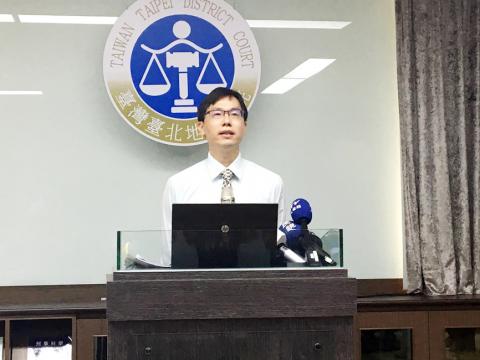The Taipei District Court yesterday ordered the seizure of US$900 million worth of financial assets belonging to arms dealer Andrew Wang (汪傳浦) and his family in a case relating to the nation’s procurement of French-made Lafayette frigates in 1993, saying the money had been gained illegally.
Ministry of Justice (MOJ) officials said the confiscation order covers the financial assets of Wang; his wife, Yeh Hsiu-chen (葉秀貞); their three sons, Wang Jia-hsing (汪家興), Wang Jia-yung (汪家勇) and Wang Jia-ming (汪家明); and daughter, Wang Jun-ling (汪君玲).
Prosecutors on July 1 last year filed a request for the seizure.

Photo: CNA
The request followed an amendment to the Criminal Code that authorizes courts to expand the scope of confiscation orders on illicit profits, pertaining to financial gains through criminal means.
According to the amendment, the confiscation takes on an independent legal capacity as opposed to its previous status as a supplementary punishment, enabling the court to recover illicit gains without a principal penalty in place.
The prosecutors requested the seizure of the assets of the Wang family in compliance with the amendment, which allows the seizure of family members’ assets in cases where the defendant has fled abroad or failed to appear in court.
Investigators have found that the price for six Lafayette-class frigates was inflated to US$2.6 billion and the Wang family had transferred their illicit gains to 61 foreign bank accounts.
Ministry officials said they would make official requests to Switzerland, Austria, Liechtenstein, Luxembourg, the Isle of Man and the British Channel Island of Jersey to freeze the accounts of the Wang family and seek the money’s return to Taiwan.
The Wang family had also wired money to bank accounts in nine other countries, officials said.
However, Taiwan does not have mutual legal assistance pacts with those nations, or their judiciary systems have refused to cooperate with Taiwan on the case, so the court has not issued confiscation orders for money held in those nations, they said.
Andrew Wang, a Taiwanese agent for Thomson-CSF, the French contractor for the Lafayette warships, fled Taiwan on Dec. 20, 1993, after the body of navy captain Yin Ching-feng (尹清楓) was found in waters off Taiwan’s east coast on Dec. 9 that year.
Yin was reportedly a whistle-blower who had planned to report on the graft and money being siphoned off by numerous figures involved in the deal.
A fugitive on the run since 1993 and who is on Taiwan’s most-wanted list, Andrew Wang was reported to have died in the UK in February 2015 at the age of 86. However, some people believe he faked his death to avoid criminal prosecution.
Prosecutors in 2006 indicted Andrew Wang, seeking a life sentence for him, as well as a 16-year term for Yeh, and terms of between 11 and 14 years for his four children.

The US government has signed defense cooperation agreements with Japan and the Philippines to boost the deterrence capabilities of countries in the first island chain, a report by the National Security Bureau (NSB) showed. The main countries on the first island chain include the two nations and Taiwan. The bureau is to present the report at a meeting of the legislature’s Foreign Affairs and National Defense Committee tomorrow. The US military has deployed Typhon missile systems to Japan’s Yamaguchi Prefecture and Zambales province in the Philippines during their joint military exercises. It has also installed NMESIS anti-ship systems in Japan’s Okinawa

TRAGEDY STRIKES TAIPEI: The suspect died after falling off a building after he threw smoke grenades into Taipei Main Station and went on a killing spree in Zhongshan A 27-year-old suspect allegedly threw smoke grenades in Taipei Main Station and then proceeded to Zhongshan MRT Station in a random killing spree that resulted in the death of the suspect and two other civilians, and seven injured, including one in critical condition, as of press time last night. The suspect, identified as a man surnamed Chang Wen (張文), allegedly began the attack at Taipei Main Station, the Taipei Fire Department said, adding that it received a report at 5:24pm that smoke grenades had been thrown in the station. One man in his 50s was rushed to hospital after a cardiac arrest

‘WIN-WIN’: The Philippines, and central and eastern European countries are important potential drone cooperation partners, Minister of Foreign Affairs Lin Chia-lung said Minister of Foreign Affairs Lin Chia-lung (林佳龍) in an interview published yesterday confirmed that there are joint ventures between Taiwan and Poland in the drone industry. Lin made the remark in an exclusive interview with the Chinese-language Liberty Times (the Taipei Times’ sister paper). The government-backed Taiwan Excellence Drone International Business Opportunities Alliance and the Polish Chamber of Unmanned Systems on Wednesday last week signed a memorandum of understanding in Poland to develop a “non-China” supply chain for drones and work together on key technologies. Asked if Taiwan prioritized Poland among central and eastern European countries in drone collaboration, Lin

ON ALERT: Taiwan’s partners would issue warnings if China attempted to use Interpol to target Taiwanese, and the global body has mechanisms to prevent it, an official said China has stationed two to four people specializing in Taiwan affairs at its embassies in several democratic countries to monitor and harass Taiwanese, actions that the host nations would not tolerate, National Security Bureau (NSB) Director-General Tsai Ming-yen (蔡明彥) said yesterday. Tsai made the comments at a meeting of the legislature’s Foreign Affairs and National Defense Committee, which asked him and Minister of National Defense Wellington Koo (顧立雄) to report on potential conflicts in the Taiwan Strait and military preparedness. Democratic Progressive Party (DPP) Legislator Michelle Lin (林楚茵) expressed concern that Beijing has posted personnel from China’s Taiwan Affairs Office to its